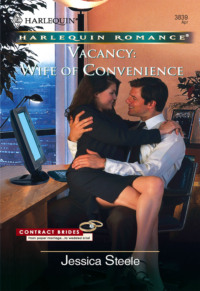
Полная версия
A Nine-to-five Affair

Jessica Steele is the much-loved author of over eighty novels.
Praise for some of Jessica’s books:
“Jessica Steele pens an unforgettable tale filled with vivid, lively characters, fabulous dialogue and a touching conflict.”
—Romantic Times BOOKclub
“A Professional Marriage is a book to sit back and enjoy on the days that you want to bring joy to your heart and a smile to your face. It is a definite feel-good book.”
—www.writersunlimited.com
“Jessica Steele pens a lovely romance…with brilliant characters, charming scenes and an endearing premise”
—Romantic Times BOOKclub
Promise of a Family #3915
“We sleep together—and I’m still Mr. Cunningham?” Barden’s gray eyes had the light of devilment in them.
“Not in that context!” she protested. “We shared a room, that’s—” She broke off. It had to be said that he’d seen more of her, in the literal sense, than any man she was on first-name terms with.
“I really think, Emily—” he took over when she seemed to be floundering “—that we know each other well enough for you to use my first name.”
A Nine-To-Five Affair
Jessica Steele

www.millsandboon.co.uk
MILLS & BOON
Before you start reading, why not sign up?
Thank you for downloading this Mills & Boon book. If you want to hear about exclusive discounts, special offers and competitions, sign up to our email newsletter today!
SIGN ME UP!
Or simply visit
signup.millsandboon.co.uk
Mills & Boon emails are completely free to receive and you can unsubscribe at any time via the link in any email we send you.
Jessica Steele lives in the county of Worcestershire with her superhusband, Peter, and their gorgeous Staffordshire bull terrier, Florence.
Any spare time is spent enjoying her three main hobbies: reading espionage novels, gardening (she has a great love of flowers) and playing golf. Any time left over is celebrated with her fourth hobby, shopping.
Jessica has a sister and two brothers, and they all, along with their spouses, often go on golfing holidays together.
Having traveled to various places on the globe researching background for her stories, there are many countries that she would like to revisit. Her most recent trip abroad was to Portugal, where she stayed in a lovely hotel close to her all-time-favorite golf course.
Jessica had no idea of being a writer, until one day Peter suggested she write a book. So she did. She has now written over eighty novels.
CONTENTS
CHAPTER ONE
CHAPTER TWO
CHAPTER THREE
CHAPTER FOUR
CHAPTER FIVE
CHAPTER SIX
CHAPTER SEVEN
CHAPTER EIGHT
CHAPTER ONE
SO MANY thoughts and emotions went through Emmie’s mind as she drove to the job interview that winter’s afternoon, chiefly how desperately she needed this position, and the tremendous hope that she would be successful in getting it. It didn’t matter that it was only temporary—probably a maximum of nine months—it paid extremely well and would afford her some financial breathing space.
The work involved as assistant PA, and then acting PA while Mr Barden Cunningham’s PA took maternity leave, would be very demanding, which accounted for the high salary. But, though Emmie had endured a blip in her career during this last year—well, several blips in actual fact—she knew, previous to that, her work record was exemplary.
Her secretarial training had been first class, and she had thought that, after three years with Usher Trading, she was really going places, and that she was due to be promoted as PA to one of the directors—only to go into work one Tuesday morning to learn, with utter astonishment, that the firm had folded. Usher Trading had, with a mile-long list of creditors, ceased trading.
It had not been her only shock that month. She had still been getting over her astonishment that, overnight, or so it seemed, Usher Trading had gone under, when her stepfather had suffered a heart attack and had died. The fact that she’d been without a job or financial security had been neither here nor there to her then. She had lovedAlec Whitford as a daughter, and now he was gone.
Emmie clearly remembered her own father. He had been a scientist dedicated to his work, and for a lot of the time had seemed to be in a world of his own. He had also died, in some experiment that had gone wrong, when she had been ten years old.
Her life had been different then, Emmie recalled. Her family had lived in an elegant house in Berkshire and had been very comfortably off—sufficiently so for her mother to be able to indulge her love of antiques.
They’d had a whole houseful of beautiful furniture when, two years after her husband’s death, her mother had married Alec Whitford. Alec had been a total contrast with Emmie’s father. Alec had loved to laugh, and had been full of life, but—he hadn’t liked work.
Though it hadn’t been until after her mother’s death three years later, in one of those freak garden machinery accidents that were never supposed to happen, that Emmie had begun to have any inkling that she and Alec were not financially sound.
She had been fifteen then. ‘Shall I get a job, Alec?’ she’d asked him, her thoughts on evening and weekend work.
‘I wouldn’t dream of it, sweetheart,’ he’d said. ‘We’ll sell something.’
By the time she was eighteen, and had completed a most meticulous business training, there hadn’t been much left to sell. By then Emmie had grown up fast to value security above all else. She’d loved her stepfather, and wouldn’t have had him be any different, but he had seemed to make an art out of spending. She’d rather thought then—and later knew—that he was having a one-sided affair with his bookmaker—Alec doing the giving, his bookmaker taking.
Emmie’s mother had died intestate, so the house had passed to Alec. By that time Alec’s mother, a formidable if slightly unconventional woman, had been living with them. Hannah Whitford had turned eighty, but was as sharp as a tack—and didn’t suffer fools gladly. Emmie had calculated that she must be some kind of step-grandmother to her, but when out of respect she’d addressed her as Mrs Whitford, the thin, straight, white-haired woman had advised her that, since she drew the line at being called ‘Granny’, Emmie could call her Aunt Hannah.
So Aunt Hannah she had become. She had her own private pension—but, having already ‘lent’ her son her savings, had declined to let him see any of her pension. ‘If you’re that hard up,’ she’d told him forthrightly when he’d come on the scrounge, ‘sell the house!’
So he had. And they’d moved to a three-bedroomed rented apartment in a very nice area of London. And Emmie had started work at Usher Trading. All in all, given that Emmie had learned to more and more value her security, she had come to love Aunt Hannah too, and the next three years had passed very pleasantly.
And then Emmie had been made redundant and dear Alec had died. About that time, when Emmie had been trying to get a grip on things, she’d become startled to realise that Aunt Hannah was occasionally losing her grip a little!
At first Emmie had put it down to the fact that, for all Alec’s mother had used to tear him off a strip from time to time, she had dearly loved him—and had lost him. Perhaps, when she had come to terms with her grief, she would be her old self again.
In the meantime, Emmie had found herself a new job with a firm of insurance brokers—and managed to hold it down for six weeks! Then her womanising boss, not content with the extramarital affair he was having—the phone calls she’d overheard had spoken volumes—had had the utter nerve, after many ignored hints, to one day openly proposition her! That was when Emmie had discovered she was quite good in the tearing-off-a-strip department herself. Because, though it had been entirely unplanned, she’d been goaded beyond all possibility of suffering her new employer’s lecherous advances any longer, she’d let fly with her tongue—and found herself out of a job.
She’d consoled herself that she didn’t want to work there anyway. And found herself another job. It had taken her ten weeks to lose it—this time for bad time-keeping. And it was true, her time-keeping had become appalling. But Aunt Hannah hadn’t seemed to want to get out of bed in the morning any more and, while it had been no problem to take her breakfast in bed, Emmie had found she didn’t love her work well enough to leave the apartment until she was sure Aunt Hannah was up and about.
Her third job after being made redundant from Usher Trading had lasted four months. It hadn’t paid as well, but it had been nearer to her home, which had meant she hadn’t had to leave for work so early. All had seemed to be well, until her employer’s son had come home from abroad and, obviously believing himself to be irresistible, alternated between being overbearingly officious with her or, despite the fact he had a lovely wife and children, making suggestive, sickening remarks about how good he could be to her if she’d let him.
Emmie hadn’t known how much more she could take, but supposed that working for fatherly Mr Denby at Usher Trading had rather sheltered her from the womanising types lurking out there. She’d recognised she was a novice at knowing how to handle them, and had been near to exploding again one day, when a call had come through from the local police station. Apparently they had a Mrs Hannah Whitford there, who seemed a little confused.
‘I’m on my way!’ Emmie exclaimed, holding down panic, grabbing up her bag, car keys at the ready.
‘Where are you going?’ Kenneth Junior demanded.
‘Can’t stop!’
‘Your job?’ he warned threateningly.
‘It’s yours—with my compliments,’ she told him absently. The fact that she’d just walked out was the least of her worries just then. She made it to the police station in record time. ‘Mrs Whitford?’ she enquired of the man at the front desk.
‘She’s having a cup of tea with one of the WPCs,’ he replied, and explained how the elderly lady had been found wandering the streets in her bedroom slippers and seemed distressed because she couldn’t remember where she lived.
‘Oh, the poor love!’ Emmie cried.
‘She’s all right now,’ the police officer soothed. ‘Fortunately she had her handbag with her, and we were able to find your office telephone number in her spectacle case.’
‘Oh, thank goodness I thought to jot it down!’ Emmie’s exclamation was heartfelt. She’d only put it in Aunt Hannah’s spectacle case because she’d known the dear soul would look first for her glasses before she thought to look for her phone number.
‘Has Mrs Whitford been—er—forgetful for very long?’ the policeman asked in a kindly fashion. Emmie explained how, if Aunt Hannah had, it was only recently, and only since she had lost her son earlier in the year. Whereupon, on learning that Emmie was away from the apartment for most of the day, the officer tentatively suggested that it might be an idea to consider establishing Mrs Whitford in a residential home.
‘Oh, I couldn’t possibly!’ was Emmie’s initial shocked reaction. ‘She would hate it!’ And, getting over her shock a little, she asked, ‘Was she very upset when you found her?’
‘Upset—confused, distressed—and,’ he added with a small smile, ‘just a little aggressive.’
‘Oh, dear,’ Emmie mumbled feebly. But, fully aware that Aunt Hannah had a tart tongue when the mood took her, was in no mind to have Alec’s mother ‘established’ in a residential home. Even if, while waiting for Aunt Hannah, the kindly policeman did suggest to her not to dismiss the notion out of hand, that residential homes weren’t jails, and that if those in charge knew where residents were, they were quite at liberty to come and go as they pleased. For unintentional but added weight, he mentioned that while indoors someone was there all the time to keep an eye on residents, and see to it that they had their lunch.
Hannah Whitford suddenly appeared from nowhere. ‘All this fuss!’ she snapped shortly, quite back to normal, but Emmie, who knew her well, knew that she was more embarrassed than cross. ‘Have you got your car outside?’
Emmie was not about to give the police officer’s ‘residential home’ suggestion another thought. But Aunt Hannah, either having had a similar conversation with the woman police constable who’d looked after her, or having done some serious thinking of her own, brought the subject up herself. It was around lunchtime the following day that, having been deep in thought, Aunt Hannah suddenly seemed to realise that Emmie was not at work.
‘What are you doing home?’ she demanded in her forthright way.
‘I thought I’d look for another job,’ Emmie replied, aware that, with yesterday’s confusion behind her, Aunt Hannah was getting back to being as sharp as she had ever been.
‘Because of me.’
It was a statement, and despite Emmie telling her that she would have walked out of her job anyway, without receiving the phone call from the police station, Aunt Hannah would not have it.
Nor would she countenance—despite Emmie’s protestation—that she should become a burden to her step-granddaughter. But it was only when Emmie saw that she was growing extremely agitated that she agreed—more in the hope of calming her down than anything—to investigate the possibility of her step-grandmother moving to a residential home.
Aunt Hannah, as Emmie later realised—and might have known—was not prepared to stop at mere investigation. So they set off doing the rounds of residential homes. The first one they looked at, Keswick House, was in actual fact a very pleasant surprise. Light and airy, with its residents seemingly busy with their own pursuits, and a general cheerful atmosphere about the place. All residents were encouraged to bring their own furniture. There was, however, one very big drawback—it was expensive. To stay there was going to take all of Mrs Whitford’s income and more.
With Aunt Hannah not ready to give up the idea, they began to look at other establishments. By then Emmie was starting to realise that, if she herself was out all day—as she would be when she found herself a new job—perhaps as a legacy of when Aunt Hannah had forgotten where she lived that day, the old lady would be frightened and nervous of being on her own. Aunt Hannah, Emmie all at once knew, needed to feel safe.
But, in adjusting to the fact that the dear soul was determined to move out, Emmie was not prepared to let her go and live just anywhere. The trouble was, though, that while one or two of the places they looked at were adequate, there were others that Emmie would not dream of allowing her step-grandmother to move to.
Emmie couldn’t bear the thought that Aunt Hannah might feel frightened and unsafe in their apartment. She blamed herself that, when clearly Aunt Hannah needed company, she had left her on her own for so many hours during the day. But—Emmie had to work.
It wasn’t until the following day, when Aunt Hannah had another spell of confusion—and came out of it looking very bewildered—that Emmie knew for sure what had to be done. How, for goodness’ sake, would Aunt Hannah have coped if she’d been out at work? Aunt Hannah had to feel safe! Emmie rang Lisa Browne, the owner of Keswick House.
A week later, on the day before Emmie started her new job, Mrs Whitford moved into Keswick House. Fortunately, what with packing her personal treasures and looking forward to the move, she had entirely forgotten the stated fee required, and was happy to sign anything Emmie gave her and to leave all the paperwork to her step-granddaughter. Two weeks after that Emmie moved out of the well-maintained three-bedroomed apartment that had been the family home, to a two-bedroomed flat in a much less salubrious area.
Emmie ignored the peeling paint and the rotting woodwork of the front door, and strove to think positively. The house was old; what did she expect? Anyhow, because of its age, it would set off her few remaining pieces of antique furniture a treat. Well, it would when she’d stripped the walls and redecorated. And also, don’t forget, it was a ground-floor flat—ideal for when Aunt Hannah, who wasn’t so good with stairs, came to stay. As an extra bonus, it was only half the rent of the former apartment, so, providing she hung on to her new job at Smythe and Wood International, she could just about scrape up the shortfall required to keep Aunt Hannah at Keswick House.
A month later, however, and Emmie was having a hard time in staying optimistic. Her new flat was looking super. Newly decorated, with carpets and curtains as well as her mother’s good quality furniture, which had transformed it. Emmie had become friends with Adrian Payne, the man who had the upstairs flat. Non-licentious Adrian, who was true to his ex-live-in-girlfriend Tina, had in part restored her faith in men.
Not completely, however. For her new boss, Clive Norris, turned out to be the womanising type she had just about had enough of. Her job at Smythe and Wood, it had to be said, was just not working out. While the tasks were no problem—she had a quick brain and absorbed instruction easily—she couldn’t help wondering what was wrong with some of these men that they had to touch her, to hint—more than hint in some cases—that they’d quite care to be more than boss-PA-friendly.
Or, was it her? She didn’t think so. She was sure she didn’t go around giving off come hither signals. She knew she hadn’t been at the back of the queue when looks had been handed out. Alec had once declared she was utterly beautiful, but he had been in one of his happy moods. Though she had taken herself off to the mirror to check. Slender, five feet eight in bare feet, she had studied her flawless complexion, her straight, shoulder-length black hair, and looked into her liquid brown eyes. And then grinned, revealing perfect white teeth, and concluded that her stepfather had been just a little bit biased in her favour.
All this came back to her now, as she pulled into the car park of Progress Engineering for her interview. She was early. Emmie sat in her car, reflecting how disastrous everything had been just lately.
Needing the money she had doggedly stuck it out at Smythe and Wood, but she hadn’t liked working for Clive Norris. Nor, to start with, had Aunt Hannah settled at Keswick House very easily. She disliked rules, and either by accident or design forgot to note in the ‘Out’ book where she was going when she went for a morning’s short walk.
She invariably returned before anyone started to get anxious, but Emmie had received several phone calls to say Mrs Whitford had disappeared without saying where she was going, and had been absent some hours now, and they were starting to be concerned that she hadn’t returned. Emmie had given Aunt Hannah a key to the new flat, and on that first occasion Emmie had to leave her office and hare back to the flat—Aunt Hannah hadn’t been there. Thinking that perhaps Aunt Hannah might have returned to their old apartment, Emmie had rushed there, and with overwhelming relief had found her there, chatting, as nice as you please, to one of their former neighbours.
Emmie had Aunt Hannah to stay with her at the weekends, yet, despite her becoming familiar with the new area, whenever her step-grandmother did her disappearing act from Keswick House it was never to Emmie’s new flat in the run-down area that she made for, but always their previous apartment.
But now, two and a half months after moving into Keswick House, Aunt Hannah seemed to have settled down. In fact, Emmie hadn’t had to have any unexpected time off in the last two weeks. Until yesterday. She’d had Aunt Hannah with her for an extended weekend, and the plan had been to return her to Keswick House, five miles away, on Monday morning. But Emmie had overlooked the fact that her step-grandmother was never in any hurry to start her day, the result being that Emmie had been an hour late in getting to work yesterday.
She always worked late to make up for any time she had off. But yesterday, unfortunately, so too had Clive Norris.
‘We could be doing better things than this,’ he hinted, coming over and causing her to have to move away from the filing cabinet by which she was standing. ‘Come and have a drink with me,’ he went on, managing to make it sound more suggestive than a suggestion as he backed her into a corner.
‘No, thanks,’ Emmie replied, coolly but politely—and she saw Clive’s expression change.
He didn’t like it. ‘You’re too stuck-up by half,’ he said nastily. ‘You want taking down a peg!’ he went on resentfully. And while she stood there feeling uncomfortable, wishing he’d go home and leave her in peace, to her absolute amazement the next thing she knew was that he made a grab for her and tried to kiss her.
His wet, lascivious lips made her heave. She wasn’t thinking by then, but reacting—and her reaction was swift and immediate. She hit him with full force, and compounded that by giving him a furious push away from her. He ended up on the floor—looking ridiculous. He didn’t like that either.
She stepped over him, grabbing up her coat and her bag. ‘Goodnight!’ she exploded, already on her way.
‘Don’t come back!’ he screamed after her. He should be so lucky!
An hour later she calmed down, knowing that while she couldn’t regret what she had done at the same time she simply couldn’t afford to have done it. Not that she was going to ask for her job back. The thought of working for Clive Norris again made her shudder.
There had been just one letter in the post on Tuesday morning. She’d opened it and very nearly weakened in her resolve not to ask for her job back. Her letter was from Keswick House. One of the larger rooms had become available and Mrs Whitford had asked to transfer—would that be in order? Emmie had read on down, taking in the increased charge of the room. Oh, heavens, she couldn’t afford it; she really couldn’t. Well, not unless she managed to find a much better-paid job than the one she’d just walked out of. Clearly Aunt Hannah just hadn’t taken into consideration when deciding that she’d like to move to a larger room that it would be more expensive.
Emmie went out and bought a paper and scanned the Situations Vacant column. One job had stood out from all the rest—assistant and then acting PA. The salary alone suggested it would be to someone very high up. She could do it, she knew that she could, and the salary named was beyond her wildest imaginings. The only snag was that the post was to cover maternity leave, and as such was only temporary. Emmie put the paper aside—then picked it up again as it dawned on her that so far over these last twelve months the longest she’d stayed anywhere had been four months. To work somewhere while covering maternity absence was starting to sound more like permanence to her. Besides which, if she had this sort of a salary coming in Aunt Hannah could move into the larger room and would perhaps be even more settled.
And, anyhow, Progress Engineering was no twopenny-half-penny firm. The company were well-known in the mechanical and electronic engineering field. Surely, if she proved herself as good as Mr Denby had always said she was, might they find a niche for her within the organisation when the PA returned from maternity leave?
First, though, get the job. Hoping against hope that anyone better qualified would be more career-minded than to want to apply for a temporary job, Emmie picked up the phone and dialled. ‘You’re available straight away?’ the head of Human Resources to whom she spoke had enquired efficiently.












